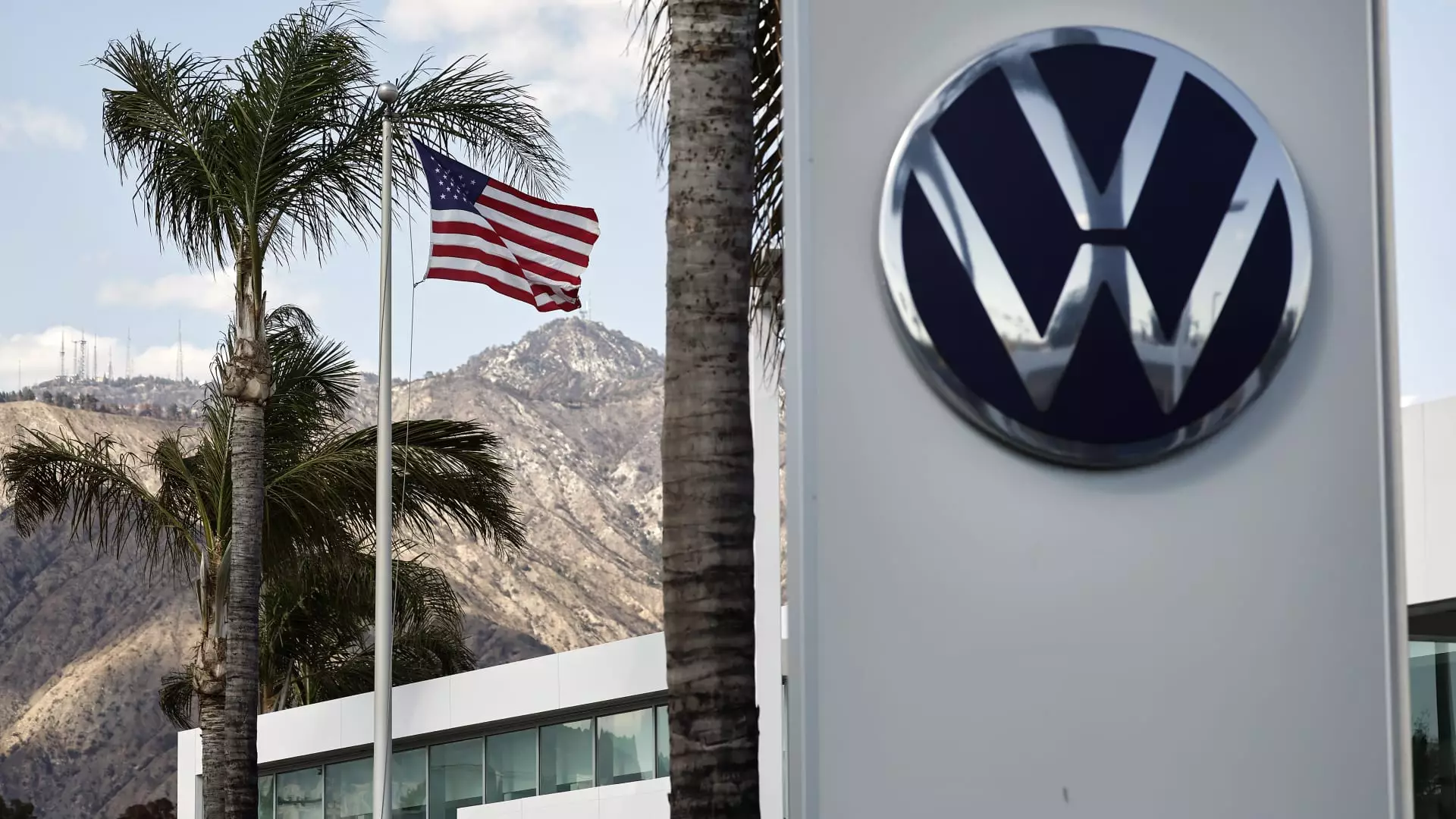In the latest financial disclosure, Volkswagen—Europe’s automotive colossus—has revealed a staggering 37% drop in its operating profit for the first quarter of the year. It reported a net operating profit of only 2.9 billion euros, translating to roughly $3.3 billion. This represents a significant setback, especially when juxtaposed against the backdrop of tightening economic conditions and the looming specter of U.S. tariffs on the automotive sector. While the company attempted to temper expectations in early April, it was still jolted by unanticipated losses that deviated sharply from analyst forecasts of around 4 billion euros.
The sudden downturn raises critical questions about Volkswagen’s ability to navigate a tumultuous global market. It is not merely a matter of product sales or financial indicators; this decline signifies a deeper vulnerability within the automotive industry. It highlights systemic weaknesses exacerbated by regulatory hurdles and evolving international trade agreements that are becoming increasingly restrictive. As the world marches towards an economic climate that heavily favors adaptive flexibility, Volkswagen’s struggle to innovate seems painfully evident.
Resilience Amidst Adversity
Despite the disappointing financials, it’s important to note that Volkswagen’s revenues nevertheless increased marginally—up by 2.8% to 77.6 billion euros. This uptick was primarily driven by robust vehicle sales outside of China. Remarkably, the company sold 2.1 million vehicles in the first quarter, edging higher by 0.9% compared to the same timeframe in the previous year. These figures suggest that, while Volkswagen may be facing headwinds, it still possesses a resilient market presence that refuses to be silenced.
However, resilience cannot mask the stark realities of an economic battlefield where competitors may be gaining ground and consumer preferences shift at an alarming rate. VW’s Chief Financial Officer Arno Antlitz accentuated the need for a focused approach to counteract external pressures: maintaining a competitive cost base alongside a well-rounded product lineup. Yet one can’t help but wonder—what happens when the competition inevitably catches on?
Political and Economic Turbulence
The uncertain backdrop of U.S. trade policy remains a critical factor influencing Volkswagen’s fortunes. With Trump’s administrational volatility, the automotive sector finds itself in uncharted waters, constantly adjusting to trade measures that can alter the landscape overnight. Although last-minute executive orders aimed to alleviate some tariff burdens, the presence of 25% tariffs on imported vehicles remains daunting for both Volkswagen and other car manufacturers reliant on the U.S. market.
Volkswagen’s decision to remain invested amid such unpredictability may commendably showcase long-term vision. However, it’s essential to critique whether such audacity will lead to fruitful returns or merely amplify the company’s operational strains. The additional levies on steel and aluminum further “stacked” atop existing tariffs require serious recalibration of supply strategies that may take years to adapt fully.
Innovation as a Double-Edged Sword
Amid these challenges, Volkswagen has positioned itself as a leader in the transition towards electric vehicles (EVs). While this pivot is commendable, the electric paradigm shift is fraught with its own complexities. The costs associated with research and development in the EV sector can be astronomical, and the competition from both established automakers and innovative startups demands that Volkswagen continuously recalibrates its strategies.
Beyond immediate profit margins, the entire automotive industry is at a pivotal junction. Regulatory pressures regarding emissions have intensified, compelling Volkswagen to redirect focus and funding that might otherwise have bolstered its traditional vehicle lines. The argument for electrification is strong; however, it’s crucial to analyze whether this bold venture will yield a sustainable legacy or serve as an anchor in turbulent waters.
Future Outlook: A Cautionary Tale
Looking ahead, Volkswagen has already tempered expectations regarding its operating return on sales and net cash flow for the year. Political uncertainties and intensified trade restrictions will likely act as formidable barriers to growth. As the company struggles to navigate the tumult of 2024, it faces not merely a financial quandary, but a philosophical challenge: how to balance legacy practices with the urgent demands of a new era in automotive technology.
In a world where adaptability has become the price of survival, Volkswagen’s ongoing struggles are indicative of an industry in flux. As traditional margins tighten and geopolitical tensions mount, the pressing questions become: Can Volkswagen redefine itself effectively, or will it fade into obscurity in the wake of change? The answers may lie not in numbers alone, but in its ability to innovate against a backdrop of ongoing adversity.


Leave a Reply